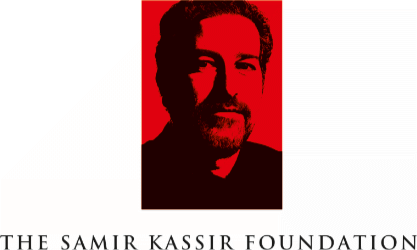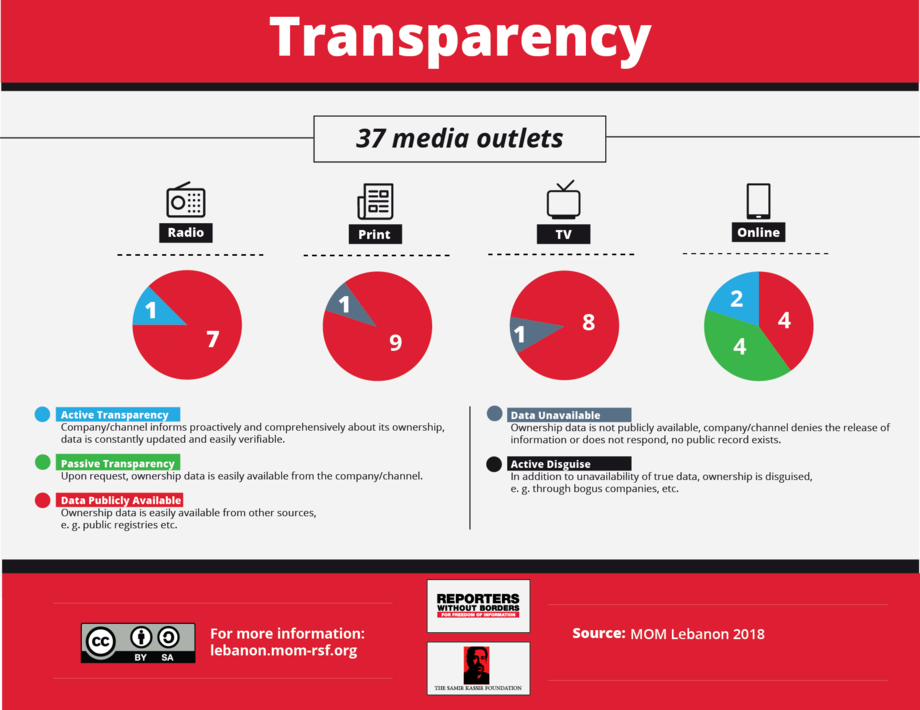Media and Transparency
After nearly a decade of preparation, Lebanon’s Parliament ratified a Right to Information Law in January 2017. This law obliges all government entities to “publish key documents showing indicators of each office’s performance, such as an annual report, orders and decisions, and office expenditures.” The law also outlines a process whereby “specific information can be requested from the government” Although the law was generally viewed as a positive step towards improving transparency and public accountability, civil society stakeholders still face challenges in requesting information and in appealing cases where access to information was denied.
Finding the right information
The MOM team was unable to obtain information about the owners of media companies and their shares through the website of the Ministry of Justice’s commercial registry (http://cr.justice.gov.lb) due to a malfunction of the site. The other option was to request hard copies of the commercial certificate through the lawyer.
While officially the fee per file is reasonable (6,000 LBP or 4 USD), it is customary to pay an additional amount to speed up the service. And even when the documents are provided, they are not error-proof.
Almost zero response rate to requests
The response rate for questionnaires sent via email to companies and media outlets was very low. Only 11 of the 35 media outlets responded: MTV, LBCI and Télé Liban, three radio stations (“Al-Fajr”, “Voice of All Lebanon 93.3” and “Voice of Lebanon 100.5”) and three websites (Daraj, Megaphone and Lebanon Debate), as well as Liwaa and L'Orient-Le Jour newspapers.
The MOM team did not make any official request using the 2017 Right to Information Law because of the absence of formal procedures to do so, but also because the information would be provided by the Commercial Register, which already offers an interface to access information.
Ownership Transparency
Lebanese corporations are required to register their minutes of meetings with the Commercial Register. This is mandatory regarding the approval of annual accounts or the raise or decrease of capital. Therefore, whenever a media outlet is owned by a corporation, its corporate file is made public via the Commercial Register. Companies that do not register their minutes are fined for each month and/or year of delay by the Ministry of Finance and the Commercial Register, operating under the Ministry of Justice. However, when it comes to transfer of shares, i.e. to associate a new member, registration is not immediately required. Accordingly, changes regarding the partners and shareholders may remain hidden. When there is a change in the management of the company (director, board of directors, chairman), companies are not fined if registration is missing. However, they shall not be able to move on with any other procedure requiring registration before they get the minutes of the meeting related to the change in the management registered.
- Al-Akhbar, Al-Joumhouria, Sawt El-Mada, and LBCI are owned by individuals and companies; the latter are mostly owned by the same individuals who have direct shares in the aforementioned media outlets.
- At Al-Mustaqbal and Al-Jadeed, some shareholders are in fact staff of other companies owned by the main two families owning the media outlets, respectively the Hariri and the Khayat dynasties.
- Shareholders of Al-Binaa newspaper, RLL, Voix du Liban 100.3, Al-Nour Radio, and Al-Manar are high officials of the respective parties owning the media outlets: the Syrian Social Nationalist Party, the Lebanese Forces, the Phalange Party, and Hezbollah. In fact, shareholders in these cases act as proxies on behalf of the party they belong to.
- NBN, OTV, and Sawt El-Mada are also owned by party members and supporters, but in these cases, they do not act on behalf of the party. Shareholders are either business associates of the party leaders or wealthy party members that use their resources to support the communication of the political groups they belong to, respectively Amal Movement and the Free Patriotic Movement.
- The Hariri family is involved in several media outlets through different schemes. They directly own shares in Future TV and Al-Mustaqbal newspaper. More indirectly, their involvement in Annahar and Radio Orient goes through companies they own, respectively Al-Mal Investment Co and Wave Holding. The case of their involvement in The Daily Star is even more peculiar. The newspaper officially belongs to D.S. Holding, which is owned by Middle Holding, a subsidiary of Millennium Development SAL, which is owned by Millennium Development International, registered in the Cayman Islands, which prevented us from detailing its ownership structure. Nonetheless, it is worth noting that Millennium Development SAL was founded by Millennium Development Holding SAL, a company owned by the Hariri family.
- While the name of shareholders of MTV is available, the percentage of each one of the five shareholders is not. The same applies to the shareholders of the Hezbollah-affiliated Lebanese Communication Group L.C.G SAL.
- OTV also has a special ownership structure. It broadcasts based on a license provided to Alubnaniya lil I’lam, which is owned by President Michel Aoun’s family and leading Free Patriotic Movement members. However, the finance and advertising are controlled by OTV Holding, a company that is partly publicly traded, with the rest of the shares also belonging to President Aoun’s family and leading FPM members. The list of shareholders for the publicly traded part was not made available.
- A number of websites are not registered as separate legal entities. They are operated directly by the parties, individuals, or associations that have created them. It is the case of Tayyar.org (Free Patriotic Movement), Lebanese-Forces.com, Lebanon Debate (Michel Kanbour), and Ya Sour (Ya Sour Media and Social Group).
As for the owners of digital media, particularly those with an alternative angle, their structures seemingly primarily rely on a non-profit model, with an overwhelming sense of "shared ownership". Nevertheless, the companies and legal entities behind most of these outlets tend to be under the title of the founders and initial directors, making them the de jure owners, particularly as the process to establish a legal entity in Lebanon requires the registration of key people. Much of this information was provided by several of these outlets via the form distributed by the Foundation, further demonstrating a mark of active transparency
Financial Transparency
Audiovisual Media Law No. 382 of 1994 requires broadcast corporations (TV and radio), to submit their financial accounts every six months to the Ministry of Information. These accounts include only the amounts or revenues arising from the corporation’s activity. However, no financial data about any media outlet has been made available in the course of the study – neither about the sources of funding, nor the turnover.
Numerous studies have underlined the difficult financial situation of Lebanese media outlets, reflected by the number of outlets that have recently been closed or had dismissed staff. In the last five years, the following media outlets were shut down: Al-Bayrak, Assafir, Al-Balad, Al-Ittihad, and Al-Anwar newspapers, Monday Morning, La Revue du Liban, and Assayad magazines, among many others.
At the same time it is worth mentioning that several outlets are associated with larger holdings that are otherwise expanding or that belong to sectors that have not faced the same crisis, suggesting some form of cross-subsidization inside a conglomerate from more profitable areas of business to ailing media companies.
The lack of transparency of political party financing also reflects on the media sector, making it impossible to assert the sources of funding of party-owned outlets, with the exception of Al-Manar and Al-Nour. Hezbollah Secretary General Hassan Nasrallah confirmed in a public statement on June 24, 2016, that “We do not have any business projects or investments via banks… We are open about the fact that Hezbollah’s budget, its income, its expenses, everything it eats and drinks, its weapons and rockets, come from the Islamic Republic of Iran.” Yet, even in this case where the source of funding may be clearer, the exact numbers remain hidden.
Furthermore, alternative media such as Daraj Media and Megaphone News clearly state that they have established partnerships and/or are the recipients of grants from a number of organizations and media hubs on a regional and international level, including but not restricted to the European Endowment for Democracy, Open Society Foundations, the Samir Kassir Foundation, and International Media Support. Much of this information was provided by several of these outlets via their own websites/platforms and/or the form distributed by the Foundation, further demonstrating a mark of active transparency.



